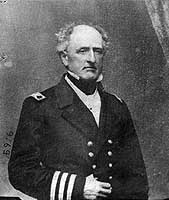
Franklin Buchanan (1800-1874)
Franklin Buchanan was born in Baltimore, Maryland, on September 13, 1800. He became a U.S. Navy Midshipman on January 28, 1815, served some years at sea, and before reaching the age of twenty-one served as acting-lieutenant on a cruise to India. He was promoted to Lieutenant on January 13, 1825, and in July, 1826, commanded the frigate Baltimore, built for the emperor of Brazil, on her voyage to Rio Janeiro. On his return he sailed in the Pacific, part of the time being attached to the Peacock. He was promoted on September 8, 1841 to master-commandant, having charge of the Mississippi, and afterward of the sloop of war Vincennes.
In 1845 he was selected by the secretary of the navy to organize the U.S. Naval Academy at Annapolis. The same year he opened the school as its first superintendent, but in 1847 left the place for the command of the sloop of war Germantown, in which he took part in the Mexican war and participated in the capture of Vera Cruz.
In 1852 he commanded the steam frigate Susquehanna, flagship of Com. Perry's Japan expedition, which opened China and Japan to the commerce of the world. He was promoted to captain on September 14, 1855.
In 1859-61, Captain Buchanan was the Commandant of the Washington Navy Yard.
Believing that his native state would soon leave the Union, Buchanan resigned his commission on April 22, 1862, after the attack on the Massachusetts troops in Baltimore. When Maryland did not secede, he wrote to Gideon Welles, secretary of the navy, withdrawing his resignation, and asking to be restored, but his request was refused. Dismissed from the service in May, he joined the Confederate States Navy in September 1861, receiving a Captain's commission.
After heading the CSN's Office of Orders and Detail, Buchanan was placed in command of the defenses of the James River, Virginia. He superintended the fitting out of Virginia and led the pioneer ironclad in her successful attack in Hampton Roads on March 8, 1862, on the Federal warships Cumberland, which was sunk, and Congress, which blown up. Buchanan was wounded by a bullet in the action and had to leave the ship before her battle with USS Monitor on the following day. For his gallantry at this time he was thanked in August 1862 by the Confederate Congress, and promoted to full admiral and senior officer of the Confederate navy.
Sent to command Confederate Navy forces on Mobile Bay, Alabama, he oversaw the construction of the ironclad CSS Tennessee and was on board her during her gallant battle with Rear Admiral David Glasgow Farragut's Union fleet on August 5, 1864. His vessel finally surrendered after her armor had been Infiltrated and her steering apparatus disabled. Wounded and taken prisoner, Admiral Buchanan was not exchanged until February 1865. He was on convalescent leave until the Civil War ended a few months later.
Following the conflict, Buchanan was for a time president of the Maryland Agricultural College (1868-69), and afterward was for a few months an agent for a St. Louis life insurance company in Mobile until 1870, when he again took up residence in Maryland. He died at his home in Talbot County, Maryland, on May 11, 1874.
Three U.S. Navy destroyers have been named in honor of Admiral Franklin Buchanan, including Buchanan (DD-131), Buchanan (DD-484) and Buchanan (DDG-14).